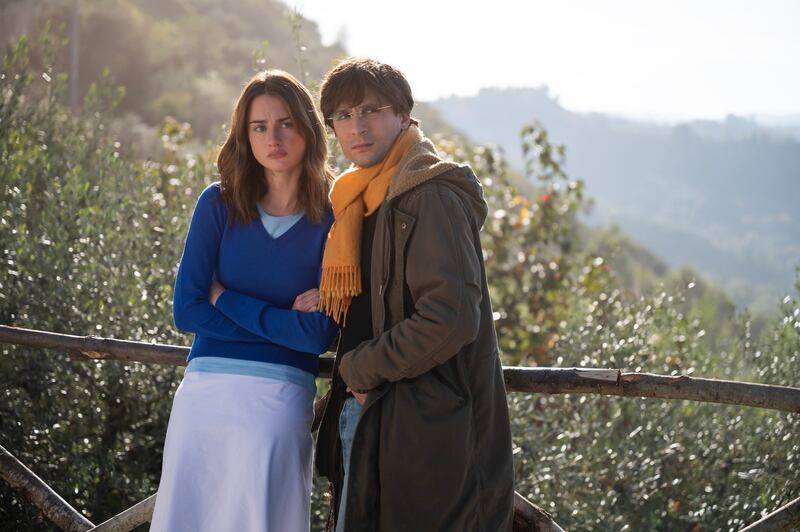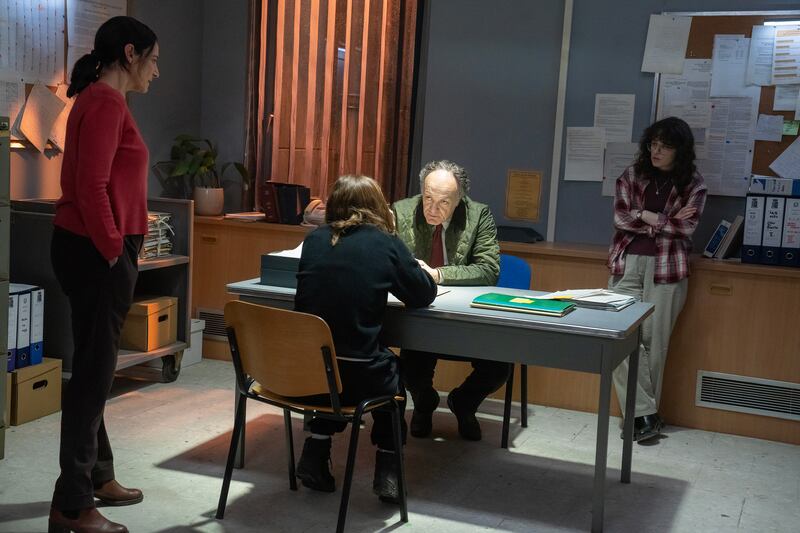Arguably, no name is more synonymous with modern true crime than Amanda Knox. Wrongfully convicted of killing her roommate, Meredith Kercher, while studying abroad in Italy, a then-20-year-old Knox faced torrents of tabloid misogyny and four years in prison before she was ultimately exonerated.
The public’s appetite for content regurgitating the controversial case seemingly hasn’t abated since Kercher’s murder in 2007—and that content still overwhelmingly centers Knox. She’s inspired two films (2021’s Stillwater and 2014’s The Face of An Angel), an eponymous 2016 Netflix documentary, and now, a new Hulu series out today salaciously titled The Twisted Tale of Amanda Knox.
The fact that Knox herself co-produced the show alongside Monica Lewinsky adds a layer of interest to this umpteenth retelling, offering a chance for two famously maligned women to reframe one’s story on her own terms. Yet for all the creative team’s personal intentions, The Twisted Tale’s sluggish pace, frustratingly narrow focus, and bizarre tonal shifts hold it back from becoming a definitive version of this tale.
Although the series primarily draws from Knox’s books, Waiting to be Heard and Free, it has another unexpected influence: Jean-Pierre Jeunet’s beloved French comedy Amélie, which Knox (played here by Grace Van Patten) and her then-boyfriend, Raffaele Sollecito (Giuseppe De Domenico), were watching the night of Meredith’s murder.

Following a tense opening scene in which an adult Amanda is spirited back to Italy while grinning ominously under a blanket, the show adopts Amélie’s twee magical realism to catch us up on her early years. In one scene, an audience of stuffed animals come alive, cheering for a young Amanda as she dons a full clown costume to perform for them. In another, the study abroad posters at Amanda’s college become animated, an assortment of tiny cartoon figures beckoning to her in their native languages.
She quickly hones in on the Italian poster’s calls of “Vieni qui” and decides to spend her junior year in the cobblestone streets of Perugia, which are drenched in the infamous seedy “yellow filter.”
For a show that should benefit from the real Knox’s perspective, the opening moments of The Twisted Tale are strangely uninterested in fleshing out the particulars of Amanda’s early months in Italy, or her fast friendship with Meredith (Rhianne Barreto)—perhaps showrunner K.J. Steinberg (This Is Us) assumes viewers already know the particulars via news coverage or true crime TikToks.
Within the first 10 minutes, the young woman whose murder set off this chain of events has already been reduced from a laughing study abroad friend introduced mid-montage to a dead person.

From there, The Twisted Tale spends much of its runtime as a grueling study in corrupt legal processing and wrongful incarceration. The show effectively captures the bewildering desperation and terror that Amanda experiences when she’s suddenly put up against a series of antagonistic prosecutors determined to find her guilty, in a country whose language is still largely indecipherable to her. Francesco Acquaroli plays mercurial lead prosecutor Giuliano Mignini, whose fixation on convicting Amanda on scant, faulty evidence is tied back to a tidy series of flashbacks in which his adolescent self clings to black-and-white logic to cope with the fallout of war and a local serial killer.
Apart from clunky voiceover lines about Amanda’s “mistold and madly twisted tale” and Giuliano’s belief that Meredith is the embodiment of “beauty, promise, and purity touched by evil,” The Twisted Tale is at its most lurid during Amanda’s initial interrogations. There, Giuliano and his right-hand woman, Monica (Roberta Mattei) unleash a cascade of accusations against a sleep-deprived Amanda, their voices tuned out in a succession of dizzy hand-held closeups and ringing soundwork that culminates in her being struck. In her state of duress, Amanda wrongfully tells the police that her Congolese boss, Patrick Lumumba (Souleymane Seye Ndiaye) murdered Meredith.
Apart from a brief protest scene, the racial implications of Amanda’s accusation are skirted over almost entirely. It’s one of the more glaring consequences of the series adopting such a blinkered perspective of Meredith’s murder case and its fallout.
Supporting characters appear only in relation to Amanda—Raffaele gets a POV episode because his court appeal is so tied to hers, and Giuliano is allowed some measure of interiority so Amanda can forgive him. In the season finale, one of Amanda’s family members plainly lays out one of the key issues that has always surrounded the case: “Meredith’s murder is always discussed in the context of Amanda.”

Kercher’s sister, Stephanie Kercher, has spoken out about how her family found it “difficult to understand” if the series served any purpose. Although the Kerchers’ worries about Meredith’s death being sensationalized nearly 20 years after the fact are more than understandable, that doesn’t absolve The Twisted Tale from continuing to reduce her to her brutal murder.
Worse, the show intermittently brings back its Amélie-inspired flourishes, which start to feel increasingly queasy when placed alongside the grisly facts of this regurgitated case—in the most glaring instance, a judge suddenly removes his ears blithely as caricaturish Italian orchestration plays.
Van Patten is convincing as an idealistic young woman helplessly out of her depth. But because the show spends so long barreling between tweeness and gritty cruelty, her version of Amanda is too often reduced to a Pollyanna-ish waif whose quirks—like wearing an “All You Need Is Love” shirt to her murder trial or performing gymnastics at the police station—are waved away as the whimsical actions of a poor, naive girl beset by cartoonishly villainous Italians.
Knox’s resilience and the trauma of the ordeal she was forced to endure aren’t in question here. But in skipping over quieter, more intimate sections of her life—from her early study abroad days to her grappling with the trauma of readjusting to life in the States—our ostensible protagonist becomes strangely hollow.

This watered-down version of Knox simply isn’t given enough material to sustain an eight-hour drama. At times, the events of the series move so slowly that my mind couldn’t help but wonder how much more meaningful The Twisted Tale could’ve felt if it had mined American and Italian aughties cultural differences, the misogyny that saturated Amanda’s media persona, the xenophobic anti-Blackness that hovered over Patrick’s accusation, Meredith’s dehumanization… the list goes on and on.
Newcomers might find themselves confused over the context that the series willfully omits, while viewers who were there for every beat of the Amanda Knox saga would be better-served by a comprehensive documentary. If only this misguided attempt at reframing Knox’s story would convince Hollywood that, reliable ratings be damned, some true crime stories have already been wrung out to the last drop.
The post ‘Twisted Tale’: Amanda Knox Tells Her Scandalous Story in New Hulu Series appeared first on The Daily Beast.




